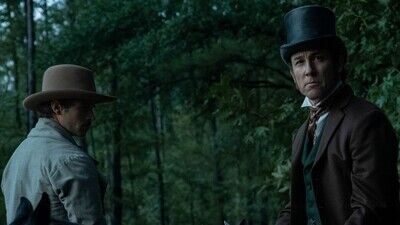From the first episode of “Manhunt” it’s apparent that there’s a spark missing. Characters drone on, the lighting is quite bleak and it’s not until the actual assassination that the promise of a “conspiracy thriller” feels real. Our gaze lays on Abraham Lincoln (Hamish Linklater) and his wife Mary Todd Lincoln (Lili Taylor) at the political satire Our American Cousin. Slowly, the curtains of the theater box pull back, and John Wilkes Booth (Anthony Boyle) is revealed behind him, cloaked in darkness like Billy from “Black Christmas.” It’s a staggering shot, and what follows after Lincoln is initially shot is a cacophony of limbs wrestling, noise and a tense score. It’s a welcomed switch from the languid pace this episode takes, but it is also unfortunately unlike anything else in the series.
There’s a foreboding dread that continues on into the series’ second episode, but, by its third, this dread has quickly diminished. It’s a shame too, as the first two episodes directed by Carl Franklin are quite intriguing. For a story like this, there needs to be stakes, otherwise it feels like we’re watching a history book in motion. “Manhunt” would have benefited from being set during the weeks leading up to Lincoln’s assassination, with the back half of the episodes showcasing Stanton’s hunt for his killer. Instead, the assassination takes place in the first episode, and all scenes leading up to it exist in fragmented flashbacks. It’s a shame, because these scenes lay an important foundation to Lincoln’s death, and their existence almost feels like an afterthought. In turn, the chase to find Booth doesn’t happen quick enough. What could have been an engaging thriller feels like a drama trying to reel viewers in by the promise of this chase, when in reality it doesn’t happen until the series is almost over.
On a performance level, Tobias Menzies is quite good as Edwin Stanton, and his scenes with Hamish Linklater as Abraham Lincoln are one of the only things tethering the show to greatness as it treks along. Watching them makes it feel like maybe you’re watching something worthwhile, but again, when they aren’t on screen it’s impossible to not feel like Linklater especially is wasted on a role that after the first episode is relegated to flashbacks.
One of the show’s highlights is the inclusion of Mary Simms (Lovie Simone), a Black woman trying to gain her freedom amidst Lincoln’s death and the impending revival of the Confederate cause. Simone is ecstatic to watch–whenever she gets screen time that is–and it’s impossible not to miss her when she isn’t on screen. She plays Mary with a resolve and passion that feels unlike any other performance in the show, harnessing her character’s stifled anger with a reverence some of her castmates seem incapable of. It’s performances like Simone’s and Menzies’ that really make you wonder why their talents are being wasted on a show so incredibly dull.

